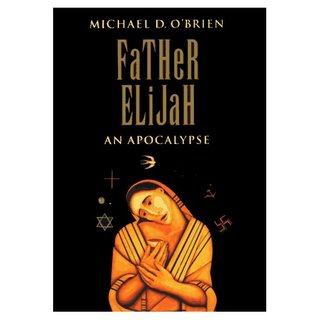Father Elijah: An Apocalypse

Father Elijah: An Apocalypse
After I read Honey for the Child's Heart (which appeared in another post) I read Honey for a Teen's Heart, also by Gladys Hunt. It is more of the same, which is good, with the exception that Hunt did not actually do all of the annotations. The annotations are much fuller than the children's version which shouldn't surprise. How much annotation does a board book need?
Since I've been lame at reading fiction for the past 7 years, I though I should get back in the game and use my local library. I found five books listed by Hunt and got them out. Father Elijah was the first I read. A died in the wool apocalypse, a genre of literature that I'm familiar with from Revelation and sadly from Left Behind. This book has more in common with the first than the latter, especially in quality.
Last night, a mother of one of my youth mentioned that here child was into reading the Bible, and that he had a particular shine for Revelation. He should read this book (I will recommend it to him) because it will open doors of interpretation open to him that otherwise would remain closed. He will see the epic scale of apocalypse without getting consumed in dispensationalism. He may see how he should/could live his everyday a little bit different.
At core, O'Brien grasps sin, perhaps a little bit like Milton grasped evil in Paradise Lost, making it just slightly too attractive. Isn't that the basis of sin however, that it is slightly too attractive? The antichrist wants peace but not peace built on truth or love. The main Catholic characters, and they are very catholic (a monk, a monsigneur, two cardinals and the Pope) get that we are both justified yet still sinners, that, in the words of my tradition, that total depravity reigns.
I look at the Mid East and think that while Annan's efforts are admirable, we fool ourselves if we think that we can have peace this side of heaven. The sin of pride, of wanting to construct a world of justice and goodness, will always run into the fact that our hearts, even the best of them, are stained. Bluntly, we need a saviour outside of ourselves as humanity and O'Brien gets this.
Back to the Catholic thing for a moment. I can deal with a lot of matters Catholic. This blog has a reference to a Catholic saint in the title. I found O'Brien a bit pedantic at points. It was the same feeling I get when I read bad philosophy told as a story - The Celestine Prophecy comes to mind. It was nowhere near as bad as that but at 576 pages, I could have done with a few less Catholic speaches.



4 Comments:
Yo, Blair. Why is there an antichrist? There is not one mentioned in the book of Revelation (only in the epistles of John)! Those Catholics don't know how to read the Bible!
Ahh, but they do know 2000 years of tradition. I hear they are really good at reading intertestamental literature compared to Mark however. There were no birds pooping in anyone's eyes in the book.
The Elijah book is part of a trilogy, non? I read one of these books some years ago, and was mesmerized. I was pulled into a very complex world, that looked a lot like the gospel. The worldly seduction of the dark side, the valiant struggle of the good. I found myself looking around for angels. It showed "spiritual warfare" in a way that had depth, and acknowledged how we fumble through our unknowing. Also, it showed mentoring, and even obedience, within the Catholic hierarchy in a positive light that is rare - perhaps unheard of - in fiction. I had lots to think about.
Thanks for reminding me, Blair.
P.
Indeed, it is part of a trilogy. I got the second one out of the library but got distracted by other readings and tasks. Seems that the trilogy started with this one and has a prequel in it. I will come back to it at some point. Gladys Hunt only mentioned this one so that is where I started.
Post a Comment
<< Home